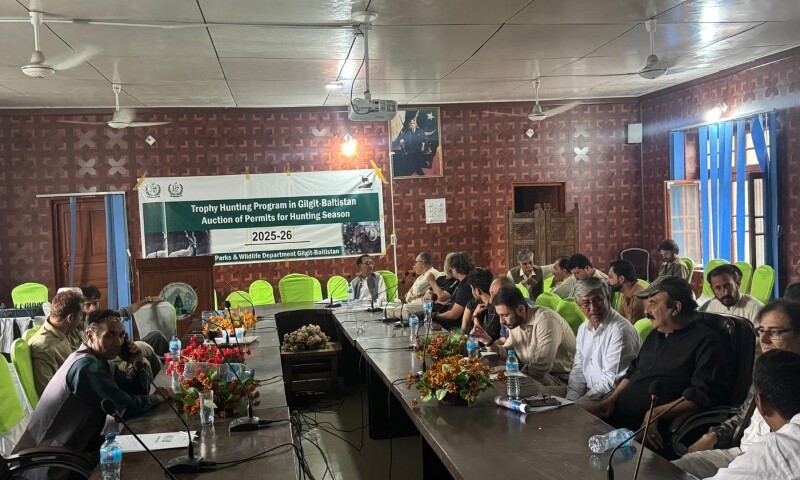The highest rate Astore markhor hunting permit was sold out for $370,000 as the Gilgit-Baltistan (GB) Wildlife and Parks Department on Wednesday auctioned permits for 118 animals, including four Astore markhors, 100 Himalayan ibex, and 14 blue sheep — for the 2025–26 hunting season.
GB’s trophy hunting programme involves local communities, who receive about 80 per cent of hunting revenues for conservation and development projects. While it has been credited with protecting endangered species, stakeholders fear the latest price hikes could jeopardise its sustainability.
The bidding ceremony was held today at the Forest, Parks and Wildlife Complex in Gilgit, where a large number of outfitters and hunters participated in an auction.
Shikar Safari’s owner, Raja Farhad Maqpoon, placed the highest bid of $370,000 and won the Astore markhor hunting permit at the Nanga Parbat conservancy area in Astore, while the second bidder won the Astore markhor hunting permit for $286,000, the third for $270,000 and the fourth permit for $240,000, respectively.
The highest bid of $40,000 was placed by Muhammad Ali Nagri from Markhor Safaris for a Blue sheep permit, and the same bidder also placed $13,000 for a Himalayan ibex and won both.
GB conservator for Parks and Wildlife, Khadim Abbas, told Dawn.com that for the upcoming season, the base price of an Astore markhor permit was raised to $200,000, while blue sheep and Himalayan ibex permits are set at $30,000 and $10,000, respectively.
Last year, the base rates were lower: $150,000 for markhor, $9,000 for blue sheep and $5,500 for ibex. The Khyber Pakhtunkhwa wildlife department had auctioned the highest rate Markhor hunting permit in Chitral for $271,000.
In the 2024-25 season, the highest bid for a markhor reached $161,000, earning the GB government more than Rs30 million.
Separately, local outfitters and tour operators argued that the sharp fee hikes were damaging their businesses and discouraging international clients.
They warned of losses for both outfitters and the local communities that relied on trophy hunting revenue.
Ikram Beg, a Gilgit-based outfitter, said participation in the programme had dropped due to inflated rates, causing “devastating” impacts on livelihoods.
“Trophy hunting can either remain a success story in GB or fade into history as a failed experiment. The choice lies in the wisdom and vision of the communities that are its true custodians,” he said.
He added that such decisions changed the objectives of the programme as the trophy hunting programme was not supposed to be a commercial endeavour.
Similarly, Syed Sumsam Ali Bokhari, chairman of Safari Club International Pakistan Chapter, warned that rising prices undermined Pakistan’s competitiveness compared to neighbouring countries.
